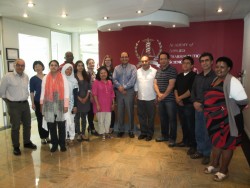Understanding the strengths and weaknesses of a system that safely monitors the creation of pharmaceutical products is only part of the challenge a Clinical Research associate faces.
Each country around the world encounters unique medical problems and chooses to respond to their health care needs in respective ways. Consideration of international health systems and cultural differences are required in the Global Studies of Pharmacovigilance. Last week, AAPS’ Global Clinical Research for Pharmacovigilance class discussed the ethical and scientific implications of Global Clinical Research.
Students took the opportunity to discuss their professional experience working in a variety of international settings. The students engaged in a discussion about how 
The program focuses on Global health care systems and regulatory agencies, health care legislations, international guidelines as well as standard operating procedures (SOP) and practices for managing clinical studies and drug safety activities.
Evaluating health systems in countries like the Philippines, China, Saudi Arabia and Botswana, the students discussed the importance of understanding the intersection of culture and education in international health systems.
A well-trained and knowledgeable clinical research and Pharmacovigilance professional plays a vital role in protecting the study participant and the general population for marketed drugs and in helping to reduce the time between drug development and marketing approval. Using practical and current real cases, AAPS integrates a unique approach and provides students with the foundation and practical knowledge to formulate a sound clinical development plan, ensure clinical trial data is credible and accurate and that the rights, integrity and confidentiality of trial subjects are protected.




